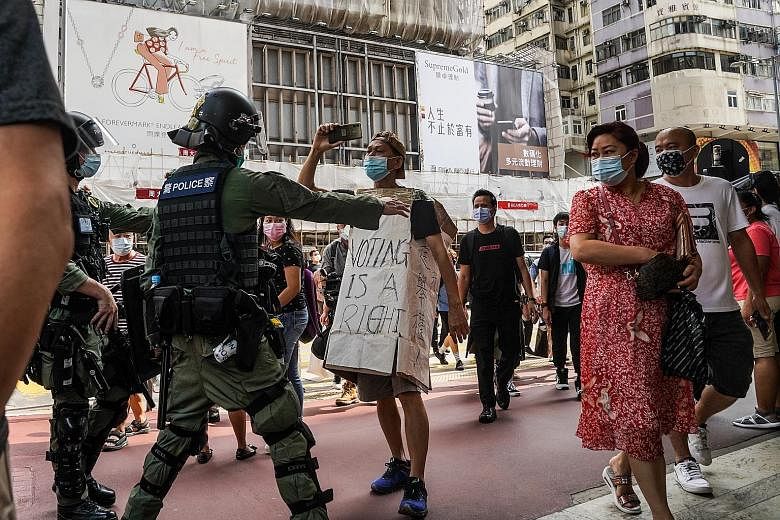HONG KONG • Police fired rounds of pepper balls at protesters in Hong Kong yesterday as hundreds took to the streets to demonstrate against the postponement of legislative elections and a new national security law imposed by China.
The police said they arrested at least 298 people, mainly for illegal gatherings, in a notice on their Facebook page.
In July, Hong Kong leader Carrie Lam postponed the Sept 6 election for seats in the Asian financial hub's Legislative Council for a year because of a spike in coronavirus cases. The move dealt a blow to the pro-democracy opposition who hoped to win a historic majority in the council, where only half the seats are directly elected and the other half are appointed members who mostly support Beijing.
"Today is supposedly our voting day, we need to resist to fight back for our vote," said a 70-year-old woman surnamed Wong as she marched with other protesters.
The vote would have been the former British colony's first official election since Beijing imposed new security legislation in late June.
The government insists the delay had no political motive.
Thousands of police were stationed around the bustling Kowloon peninsula as marchers waved placards and chanted popular anti-government slogans such as "liberate Hong Kong".
These slogans are now banned under the new security law.
Several well-known activists were arrested, including Civil Human Rights Front vice-convenor Figo Chan and former legislator Leung Kwok Hung, also known as "Long Hair", according to a post on Chan's Facebook page.
Hours before the protest, the police arrested radio DJ Tam Tak Chi, another democracy activist, for "uttering seditious words" - a colonial era offence.
Anti-government demonstrations have declined this year mainly because of limits on group gatherings, imposed to counter the spread of Covid-19, and the security law, which punishes actions that China sees as subversive, secessionist, terrorist or collusions with foreign forces.
Critics say the law aims to quash dissent in the city, while supporters say it will bring more stability after a year of often-violent anti-government and anti-China unrest.
Hong Kong returned to Chinese rule in 1997 under a guarantee of autonomy but critics say the new law undermines that promise and puts the territory on a more authoritarian path.
Advocates of the law say it plugs loopholes in national security left by the city's inability to fulfil a constitutional requirement to pass such laws on its own.
While street protests have largely lost their momentum, anti-government and anti-Beijing sentiment persists, with China's offer of mass coronavirus testing for Hong Kong residents prompting calls for a boycott amid public distrust.
The authorities have cited coronavirus fears in their moves to restrict gatherings, which are currently limited to two people, and the police have rejected applications for protests in recent months.
Hong Kong has reported around 4,800 coronavirus cases since January, far lower than in other major cities around the world. The number of new daily infections has fallen substantially from triple digits in July to single digits currently.
REUTERS, AGENCE FRANCE-PRESSE

